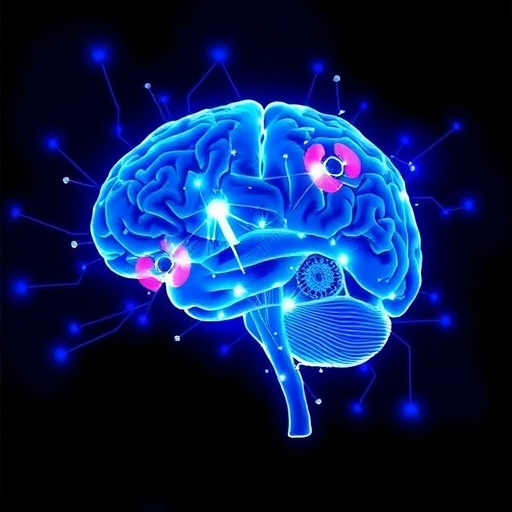In a groundbreaking study, researchers have unveiled the profound effects of arabinoxylan, a hemicellulose polysaccharide found in plant cell walls, on the neurobiological pathways associated with depression following a stroke. This research specifically focuses on the impacts of arabinoxylan on the BDNF/TrkB/p-CREB signaling pathway in the prefrontal cortex, an area of the brain crucial for cognitive function and emotional regulation, as well as the changes occurring within the intestinal microbiome. The findings are revolutionary and open a new avenue in understanding how dietary components can influence brain health and mood, particularly in populations affected by stroke.
Arabinoxylan is derived predominantly from cereals, such as wheat and rye, and has been studied for its potential health benefits, particularly its role as a prebiotic. Prebiotics like arabinoxylan enhance gut health by promoting the growth of beneficial bacteria. This study demonstrates that beyond gut health, arabinoxylan can also affect brain chemistry and function, a connection that has remained largely unexplored until now. The dual action of arabinoxylan in both the gastrointestinal tract and the brain suggests a fascinating interplay between diet, microbiome health, and mental wellness.
The researchers conducted experiments on a group of post-stroke rats that exhibited depressive behaviors, a common consequence of cerebral ischemia. These animals were administered arabinoxylan, and subsequent evaluations were performed to assess changes in the BDNF/TrkB/p-CREB signaling pathway. Brain-derived neurotrophic factor (BDNF) is a key protein that supports neuron survival, growth, and differentiation. TrkB is the receptor for BDNF, and p-CREB is a transcription factor that plays a crucial role in neuron function and survival.
The results indicated a marked increase in the expression of BDNF and its receptor TrkB in the prefrontal cortex following treatment with arabinoxylan. This enhancement suggests a neuroprotective role for arabinoxylan, particularly in mitigating the effects of stroke-induced brain injury. Moreover, the activation of the p-CREB pathway implies that arabinoxylan might also facilitate gene expression linked to neuronal health and resilience, potentially countering the cognitive decline often associated with depression after a stroke.
In addition to its effects on brain pathways, the study found significant alterations in the intestinal microbiome of the treated rats. The composition of gut microbiota shifted toward a more beneficial profile, with increased populations of beneficial bacterial species known to exert positive influences on both gut and brain health. This finding reinforces the concept of the gut-brain axis, which posits that the gut microbiome significantly impacts neurological health and mental welfare.
The implications of these findings go beyond basic science; they suggest that dietary interventions could serve as a viable strategy in managing post-stroke depression. Given that traditional treatments often yield variable results and may produce undesirable side effects, integrating natural compounds like arabinoxylan into dietary regimens presents an innovative approach to enhancing recovery in stroke survivors.
Additionally, the study highlights the role of nutrition in mental health, particularly the importance of dietary fiber. With the growing acknowledgment of the gut-brain connection, incorporating prebiotics such as arabinoxylan into the diets of those at risk for stroke or after a stroke could offer a supportive framework for mental health management.
The research underscores the complexity of neural mechanisms involved in mood regulation. The BDNF/TrkB/p-CREB signaling pathway is critical in sustaining neural plasticity and resilience to stress, both of which are crucial for preventing or alleviating depressive symptoms. By enhancing this signaling pathway, arabinoxylan may offer a protective effect against the neural damage induced by stressors like stroke.
These findings also urge further investigation into the long-term benefits of arabinoxylan supplementation. Future studies could explore optimal dosing, potential synergistic effects when combined with other nutrients, and the cellular mechanisms underlying its neuroprotective properties. The prospect of using a dietary polysaccharide to improve brain health and potentially modify the course of post-stroke recovery is an exciting and promising direction for scientific research.
As we delve deeper into the understanding of how our diet shapes our mental health, studies like this remind us of the profound connections between what we eat, our gut microbiome, and our brain. This relationship suggests a paradigm shift in how nutritional interventions could be tailored for mental health benefits,especially for vulnerable populations.
In conclusion, the findings of this study not only highlight the potential of arabinoxylan as a therapeutic agent but also exemplify the growing recognition of the interdependence of our diet, gut health, and brain function. As researchers continue to uncover the complexities involved in these interactions, the scientific journey toward realizing effective dietary strategies to combat mental health disorders, particularly following significant neurological events such as strokes, will undoubtedly pave the way for innovative approaches to holistic health.
Subject of Research: Effects of arabinoxylan on BDNF/TrkB/p-CREB signaling pathway and intestinal microbiome in post-stroke depression.
Article Title: Effects of arabinoxylan on BDNF/TrkB/p-CREB signaling pathway in the prefrontal cortex and intestinal microbiome in post-stroke depressed rats.
Article References:
Bi, By., Lin, L., Huang, L. et al. Effects of arabinoxylan on BDNF/TrkB/p-CREB signaling pathway in the prefrontal cortex and intestinal microbiome in post-stroke depressed rats. BMC Neurosci 26, 40 (2025). https://doi.org/10.1186/s12868-025-00964-6
Image Credits: AI Generated
DOI: 10.1186/s12868-025-00964-6
Keywords: arabinoxylan, BDNF, TrkB, p-CREB, intestinal microbiome, post-stroke depression, neuroprotection, prebiotics, gut-brain axis, nutritional intervention.
Tags: Arabinoxylan and stroke recoveryarabinoxylan effects on cognitionBDNF TrkB signaling pathwaydietary components and brain healthemotional regulation post-strokegut microbiome and mental wellnesshemicellulose polysaccharide benefitsmicrobiome influence on moodplant-based dietary interventionsprebiotics and brain functionprefrontal cortex and depressionstroke-induced depression research





